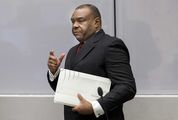Clinton will win but party’s future lies with Sanders
by Joshua Green ,
2016-03-18 07:20:53.0
HILLARY Clinton’s sweep of Florida, Illinois, Missouri, North Carolina and Ohio on Tuesday effectively slammed the door on the story that would have dominated this presidential primary season were it not for one Donald J Trump, and the rise of Vermont Senator Bernie Sanders who threatened her path to the Democratic nomination.
A self-styled "democratic socialist" and scourge of Wall Street, Mr Sanders has gone much further than anyone expected. His ability to inspire the party’s liberal grassroots — which has delivered more than $100m in financial support along with its loyalty — means that he could conceivably stay in the race until the Democratic convention in July. But, he will not be the nominee as Ms Clinton’s delegate haul all but assures that.
Ever since Mr Sanders began drawing huge crowds last summer, pundits have explained his strength as being primarily a product of Ms Clinton’s weaknesses: her trouble attracting young people, her murky ties to wealthy donors and Wall Street, her inability to energise Democratic voters despite what is, after all, an historic candidacy.
At the Democrats’ March 9 debate, Ms Clinton herself seemed to accept this critique when she said plaintively, "I am not a natural politician, in case you haven’t noticed."
Maybe not. But the true basis of Mr Sanders’s strength has been largely overlooked. He gives voice to a set of policy ideas that lie closer to the hearts of most Democratic voters — and especially the Democratic voters of the future — than Ms Clinton’s do. That is why the "revolution" he has repeatedly called for will not be quelled for long, even though Ms Clinton will be the one accepting the party’s nomination in Philadelphia. This is as much a demographic certainty as a political one.
In their 2002 book, The Emerging Democratic Majority, John Judis and Ruy Teixeira predicted that Democrats would enjoy an advantage in elections because the major demographic groups that make up their coalition — young people, minorities and single white women — were all growing as a percentage of the electorate, while the groups that Republicans rely on — married white people and seniors — were not keeping pace.
This proved prescient. In 2008 and 2012, Barack Obama successfully activated what journalist Ron Brownstein dubbed the "coalition of the ascendant" to win the White House.
Yet the rise of this new coalition has also had underappreciated policy implications.
"The groups that dominate the party now are different than the ones that dominated 20 years ago — they’re further left," says Mr Teixeira.
Indeed, millennials, minorities, and single white women all favour a more activist and interventionist government, particularly in the economic realm, than do other Democrats.
These groups not only favour more liberal policies, they are growing impatient for them. "They’re fed up with the lack of progress," says Mr Teixeira.
In hindsight, it should not be quite so surprising that Mr Sanders won more than 80% of voters under 30 in Iowa, New Hampshire and Nevada, or that young single women have flocked to him.
"There’s growing evidence that these groups are open to the boldest possible reforms. But they won’t engage unless they think you’re leading from the outside and willing to break down this system in which moneyed interests dominate government," says Democratic pollster Stanley Greenberg.
Mr Sanders fits the bill.
To her credit, Ms Clinton recognised this shift in the Democratic coalition and moved to accommodate it. She has embraced same-sex marriage, criminal justice reform, and tighter Wall Street regulations, while spurning calls to cut entitlement programmes — a mainstream Democratic position as recently as a few years ago.
"(You) deserve a president who will protect, and then expand, Social Security for those who need it most, not cut or privatise it," Ms Clinton declared in her victory speech on Tuesday night.
Most striking, she has turned against the Trans-Pacific Partnership, a trade deal she helped negotiate as secretary of state. All this looks as if it will be enough to secure her the nomination, but it may not be enough to satisfy Democratic voters under a Clinton administration.
Bloomberg

Democratic US presidential candidates Senator Bernie Sanders and Hillary Clinton wave before the start of the Univision News and Washington Post Democratic US presidential candidates debate in Kendall, Florida. Picture: REUTERS
HILLARY Clinton’s sweep of Florida, Illinois, Missouri, North Carolina and Ohio on Tuesday effectively slammed the door on the story that would have dominated this presidential primary season were it not for one Donald J Trump, and the rise of Vermont Senator Bernie Sanders who threatened her path to the Democratic nomination.
A self-styled "democratic socialist" and scourge of Wall Street, Mr Sanders has gone much further than anyone expected. His ability to inspire the party’s liberal grassroots — which has delivered more than $100m in financial support along with its loyalty — means that he could conceivably stay in the race until the Democratic convention in July. But, he will not be the nominee as Ms Clinton’s delegate haul all but assures that.
Ever since Mr Sanders began drawing huge crowds last summer, pundits have explained his strength as being primarily a product of Ms Clinton’s weaknesses: her trouble attracting young people, her murky ties to wealthy donors and Wall Street, her inability to energise Democratic voters despite what is, after all, an historic candidacy.
At the Democrats’ March 9 debate, Ms Clinton herself seemed to accept this critique when she said plaintively, "I am not a natural politician, in case you haven’t noticed."
Maybe not. But the true basis of Mr Sanders’s strength has been largely overlooked. He gives voice to a set of policy ideas that lie closer to the hearts of most Democratic voters — and especially the Democratic voters of the future — than Ms Clinton’s do. That is why the "revolution" he has repeatedly called for will not be quelled for long, even though Ms Clinton will be the one accepting the party’s nomination in Philadelphia. This is as much a demographic certainty as a political one.
In their 2002 book, The Emerging Democratic Majority, John Judis and Ruy Teixeira predicted that Democrats would enjoy an advantage in elections because the major demographic groups that make up their coalition — young people, minorities and single white women — were all growing as a percentage of the electorate, while the groups that Republicans rely on — married white people and seniors — were not keeping pace.
This proved prescient. In 2008 and 2012, Barack Obama successfully activated what journalist Ron Brownstein dubbed the "coalition of the ascendant" to win the White House.
Yet the rise of this new coalition has also had underappreciated policy implications.
"The groups that dominate the party now are different than the ones that dominated 20 years ago — they’re further left," says Mr Teixeira.
Indeed, millennials, minorities, and single white women all favour a more activist and interventionist government, particularly in the economic realm, than do other Democrats.
These groups not only favour more liberal policies, they are growing impatient for them. "They’re fed up with the lack of progress," says Mr Teixeira.
In hindsight, it should not be quite so surprising that Mr Sanders won more than 80% of voters under 30 in Iowa, New Hampshire and Nevada, or that young single women have flocked to him.
"There’s growing evidence that these groups are open to the boldest possible reforms. But they won’t engage unless they think you’re leading from the outside and willing to break down this system in which moneyed interests dominate government," says Democratic pollster Stanley Greenberg.
Mr Sanders fits the bill.
To her credit, Ms Clinton recognised this shift in the Democratic coalition and moved to accommodate it. She has embraced same-sex marriage, criminal justice reform, and tighter Wall Street regulations, while spurning calls to cut entitlement programmes — a mainstream Democratic position as recently as a few years ago.
"(You) deserve a president who will protect, and then expand, Social Security for those who need it most, not cut or privatise it," Ms Clinton declared in her victory speech on Tuesday night.
Most striking, she has turned against the Trans-Pacific Partnership, a trade deal she helped negotiate as secretary of state. All this looks as if it will be enough to secure her the nomination, but it may not be enough to satisfy Democratic voters under a Clinton administration.
Bloomberg




















Change: 1.19%
Change: 1.36%
Change: 2.19%
Change: 1.49%
Change: -0.77%
Data supplied by Profile Data
Change: -0.08%
Change: 0.12%
Change: 1.19%
Change: 0.00%
Change: 0.10%
Data supplied by Profile Data
Change: 0.32%
Change: 0.36%
Change: 0.35%
Change: 0.22%
Change: 0.23%
Data supplied by Profile Data
Change: 0.02%
Change: -0.51%
Change: -0.19%
Change: -0.17%
Change: -0.15%
Data supplied by Profile Data